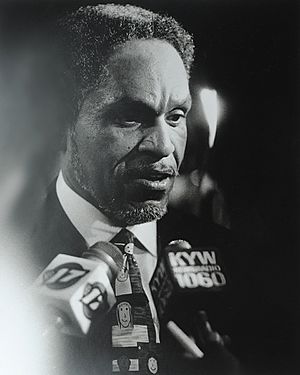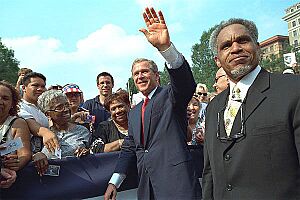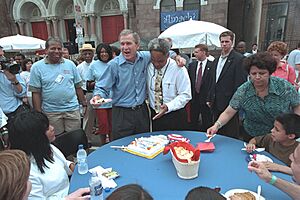John F. Street facts for kids
Quick facts for kids
John F. Street
|
|
|---|---|

Street in 1999
|
|
| 97th Mayor of Philadelphia | |
| In office January 3, 2000 – January 7, 2008 |
|
| Preceded by | Ed Rendell |
| Succeeded by | Michael Nutter |
| President of the Philadelphia City Council | |
| In office January 6, 1992 – December 31, 1998 |
|
| Preceded by | Joseph Coleman |
| Succeeded by | Anna Verna |
| Member of the Philadelphia City Council from the 5th district |
|
| In office January 7, 1980 – December 31, 1998 |
|
| Preceded by | Cecil B. Moore |
| Succeeded by | Darrell Clarke |
| Personal details | |
| Born |
John Franklin Street
October 15, 1943 Norristown, Pennsylvania, U.S. |
| Political party | Independent (since 2011) |
| Other political affiliations |
Democratic (until 2011) |
| Children | 4, including Sharif Street |
| Relatives | Milton Street (brother) |
| Alma mater | Oakwood University (BA) Temple University Beasley School of Law (JD) |
John Franklin Street (born October 15, 1943) is an American politician and lawyer. He served as the 97th Mayor of Philadelphia. He was first elected mayor in 1999, starting his term on January 3, 2000. He was re-elected for a second term in 2003, which began in 2004.
Before becoming mayor, Street was a member of the Democratic Party. He spent 19 years on the Philadelphia City Council. For seven of those years, he was the Council's president. He became mayor after Ed Rendell and was Philadelphia's second African-American mayor.
Contents
Early Life and Career
John Street was born in Norristown, Pennsylvania. He grew up on a farm. He finished high school at Conshohocken High. He then earned a college degree in English from Oakwood College in Alabama. Later, he earned his law degree from Temple University.
After law school, Street worked for a judge and the U.S. Department of Justice. He also taught English at an elementary school and at the Philadelphia Opportunities Industrialization Center (OIC). He practiced law for a short time before starting his public service career. John Street is married and has four children, including Sharif Street. He is a member of the Seventh-day Adventist faith. His brother, Milton, was also a politician.
Starting in Politics
In 1979, John Street decided to run for a seat on the City Council. He ran against Cecil B. Moore, a well-known civil rights leader. Moore passed away before the election, and Street won. To honor Moore, Street helped pass a bill to rename Columbia Avenue to Cecil B. Moore Avenue.
In 1992, Street was chosen by the City Council to be its President. He was re-elected in 1996. As President, he worked closely with former Mayor Ed Rendell. Together, they created a financial plan that helped Philadelphia turn a large deficit into a surplus. This plan helped improve the city's finances.
Mayor of Philadelphia
John Street served two terms as Mayor of Philadelphia. During his time, he focused on improving neighborhoods and helping children.
Mayoral Elections
1999 Election
John Street won the 1999 Philadelphia mayoral election in a very close race. He defeated Republican candidate Sam Katz by less than 7,500 votes. Before Street officially became mayor, the City Council President, Anna C. Verna, briefly led the city. This happened because Mayor Rendell resigned early to take a new role.
2003 Election
Street ran for re-election in the 2003 Philadelphia mayoral election. He faced Sam Katz again. Former Mayor and then-Governor of Pennsylvania, Ed Rendell, supported Street's campaign. Street won the election with 58% of the votes. This election was featured in a documentary film called The Shame of a City.
Key Policies and Initiatives
Neighborhood Transformation
During his first term, Mayor Street launched the "Neighborhood Transformation Initiative" (NTI). This program started in 2001. Its goal was to improve Philadelphia's neighborhoods. NTI aimed to fix up communities, create good housing, make streets cleaner and safer, and build new cultural and fun places.
The program helped bring new investments to many parts of the city. Since 2000, the average home value in Philadelphia has increased by about 30 percent. The housing market has continued to grow, and many new apartments and condos have been built.
Focus on Children
Mayor Street also focused on children and their well-being. In January 2000, he declared the year "The Year of the Child" in Philadelphia. He worked to get more money for after-school programs. He also created the Philadelphia Children's Commission. This group advised him on ways to help children in the city. He also tried to reduce truancy, which is when students miss school without a good reason.
School Improvements
When Street became mayor, Philadelphia's public schools faced many challenges. In 2001, a plan was made between Street and the state government. This plan allowed private companies to help manage some of the city's schools. For example, Edison Schools took over some of the schools that were struggling the most. Other schools were managed by local universities.
Public Health and Safety
Mayor Street created the Office of Health and Fitness. This happened after a magazine called Philadelphia the "fattest city" in 1999. The office worked to encourage healthier lifestyles. Street also signed a law in 2006 that banned smoking in many public places.
Street also supported building a citywide Wi-Fi network. This network was managed by a non-profit group called Wireless Philadelphia. The goal was to help more people, especially those with lower incomes, get access to the internet.
During his time as mayor, the murder rate in Philadelphia increased. In 2005, there were 380 murders, up from 330 in 2004. Many of the victims were young people. In 2006, there were 406 murders. To address this, Street launched programs like the Adolescent Violence Reduction Partnership (AVRP) in 2006. This program aimed to help young people at risk of violence.
After Being Mayor
John Street's time as mayor ended on January 7, 2008. After leaving office, he became a teacher at Temple University. He taught classes about urban politics. He said he really enjoyed teaching.
Street also served as Chairman of the Philadelphia Housing Authority (PHA) board. This board faced criticism for how it was managed. In 2011, control of the PHA was temporarily given to the federal government to fix these issues. It was returned to the city in 2013 with a new board.
In 2011, John Street changed his voter registration from Democrat to Independent. He said this change would give him more options in politics. Some people thought he might run for mayor again in 2011, but he did not. His brother, Milton Street, ran against the new mayor, Michael Nutter, but lost.
Mayoral Election Results
| Philadelphia mayoral election, 1999 | |||||
|---|---|---|---|---|---|
| Party | Candidate | Votes | % | ±% | |
| Democratic | John F. Street | 211,136 | 49.52% | -30.12% | |
| Republican | Sam Katz | 203,908 | 49.12% | +29.31 | |
| Independent | Other | 5,376 | 1% | +0.46 | |
| Majority | |||||
| Turnout | |||||
| Democratic hold | Swing | ||||
| Philadelphia mayoral election, 2003 | |||||
|---|---|---|---|---|---|
| Party | Candidate | Votes | % | ±% | |
| Democratic | John F. Street | 267,230 | 58.34 | +8.70 | |
| Republican | Sam Katz | 189,357 | 41.34 | -8.28 | |
| Socialist Workers | John Staggs | 1,291 | 0.28 | ||
| Majority | |||||
| Turnout | |||||
| Democratic hold | Swing | ||||
See also
 In Spanish: John F. Street para niños
In Spanish: John F. Street para niños
- Timeline of Philadelphia, 2000s-present
 | Jessica Watkins |
 | Robert Henry Lawrence Jr. |
 | Mae Jemison |
 | Sian Proctor |
 | Guion Bluford |



